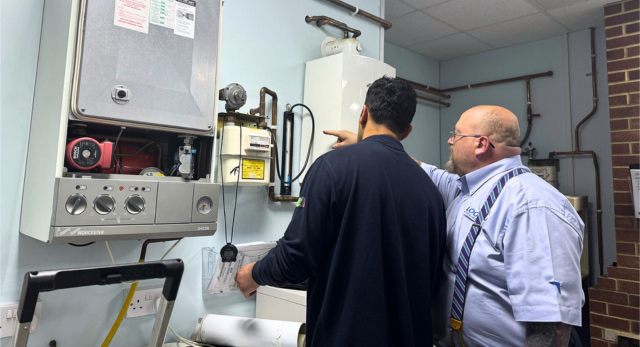In today’s world, the choice between going to university or starting an apprenticeship is a big one. Both paths offer valuable opportunities, but apprenticeships are increasingly proving to be a smart alternative to traditional university education. This blog explores why apprenticeships can be better than university, highlighting practical benefits, financial advantages, and career prospects. Whether you’re a school leaver, career changer, or employer, this guide will help you see why apprenticeships might just be the better choice.

Employment Prospects
The Numbers Don’t Lie
When comparing employment outcomes, apprenticeships consistently outperform university education in several key metrics. Recent data shows that 93% of people who completed an apprenticeship in 2023/2024 sustained employment, compared to just 87.6% of university graduates. This gap becomes even more pronounced when examining specific outcomes.
One particularly striking statistic reveals that 85% of respondents who took an apprenticeship were in full-time employment when surveyed, compared to 59% of university graduates. Additionally, 64% of apprentices continue working with the same employer after completing their training, demonstrating both the value employers place on their apprentices and the loyalty these programmes foster.
For young people particularly concerned about job security, apprenticeships offer reassurance. In sectors like construction and building services, where Logic4training specialises, demand consistently outstrips supply. The UK construction industry faces a significant skills shortage effecting the trades due to:
- An agining workforce
- More people dropping out of there apprenticships
- Brexit and the loss of EU workers
- Issues with the perception of the trades
- Lack of diversity
- Economic and supply chain pressures
- Digital skills deficit
The skills gap is a growing issue in the trades but what it presents is an opportunity for new entrants to learn a skill for life, in an industry with low competition, and make a good amount of money.
Financial Benefits
University can be expensive, with tuition fees currently up to £9,250 per year and additional living costs. Many students graduate with significant debt. The financial case for apprenticeships is compelling, particularly when contrasted with the mounting costs of university education. Current statistics paint a stark picture of student debt in the UK.
University Costs and Debt
University education has become increasingly expensive. Graduates leave university with average debts of £44,940 in England, with some extreme cases reaching over £231,000. The total value of outstanding student loans reached £267 billion at the end of March 2024, with forecasts suggesting this could reach £500 billion by the late-2040s.
Perhaps most concerningly, 67% of graduates worry about loan repayments, and 64% believe they will never clear their balance in full. With interest rates on student loans currently at 7.3% for Plan 2 loans, many graduates find themselves in a cycle where their debt grows faster than they can repay it.
Apprenticeship Financial Benefits
Apprenticeships offer a fundamentally different financial model. Instead of accumulating debt, apprentices earn while they learn. The current minimum wage for apprentices is £7.55 per hour, with wages increasing significantly after the first year. Apprentices aged 21 or over who have completed their first year are entitled to the full national living wage of £12.21 per hour.
Research demonstrates that many employers pay above the minimum rates. Gas engineers, an area where Logic4training specialises, can expect starting salaries of around £32,500 once qualified and well above the national average.
The financial advantages compound over time. Whilst university graduates spend three to four years accumulating debt, apprentices spend the same period earning money and gaining experience. This head start can result in apprentices being financially ahead of their university-educated peers within a few years of completion.
At Logic4training, our apprenticeships are designed to be affordable and financially viable for both apprentices and employers, making them an attractive option for many.
Practical Skills and Workplace Experience
One of the most significant advantages of apprenticeships is the emphasis on practical, hands-on learning. University education, whilst valuable for developing critical thinking and theoretical knowledge, often leaves graduates lacking the specific skills employers need immediately.
Real-World Application
Apprenticeships bridge this gap by combining structured learning with practical application. In building services apprenticeships, for example, students learn to install, maintain and repair electrical systems in domestic, commercial and industrial environments. They gain experience with real equipment, real problems, and real consequences, developing confidence and competence simultaneously.
At Logic4training, apprentices benefit from small class sizes, expert trainers with industry experience, and state-of-the-art facilities. This approach ensures that apprentices are job-ready from day one, rather than requiring additional training after qualification.
Mentorship and Support
Apprenticeships provide structured mentorship that is often lacking in university education. Apprentices work alongside experienced professionals who guide their development, sharing not just technical knowledge but also industry insights, best practices, and professional standards.
This mentorship creates a supportive learning environment where apprentices can ask questions, make mistakes, and learn from them without the consequences of poor performance in a real job. The result is faster skill development and greater confidence.
Industry-Specific Training
Unlike the broad-based approach of university education, apprenticeships are laser-focused on specific industry needs. Our apprenticeship programmes are designed in partnership with employers to ensure training meets actual workplace requirements. This means apprentices learn exactly the skills they’ll use in their careers, with no wasted time on irrelevant theory.

The Impact of AI
Artificial intelligence (AI) is transforming many industries, raising concerns about job security, especially in roles that involve repetitive, rule-based tasks. However, the skilled trades stand out as some of the safest careers in this new era of automation.
Why AI Won’t Replace Skilled Trades
- Manual Dexterity and Problem-Solving: Tasks like plumbing, electrical work, and gas engineering require hands-on skill, adaptability, and creative thinking. AI and robots struggle with the unpredictable environments and unique challenges that tradespeople face daily.
- The Human Touch: Building trust with clients, understanding their needs, and delivering tailored solutions are uniquely human abilities. Customers value the professionalism, empathy, and communication skills that only a person can provide.
- Unstructured Work Environments: Unlike factory settings, every site and job in the trades is different. Skilled workers must quickly assess, adapt, and deliver solutions on the spot. Something AI simply can’t replicate.
AI as a Tool, Not a Threat
Rather than replacing skilled trades, AI is enhancing the sector by:
- Streamlining admin tasks like scheduling and stock management
- Powering advanced diagnostics for faster, more accurate repairs
- Improving safety with AI-driven monitoring and alerts
- Supporting continuous learning through personalised training resources
Tradespeople who embrace these technologies become even more valuable, focusing on complex problem-solving and customer service while letting AI handle the repetitive admin.
Opportunity, Not Obsolescence
The UK’s construction and building services sectors are facing a severe skills shortage, with over 140,000 unfilled vacancies and more than a million additional workers needed by 2032. As AI automates routine office roles, demand for skilled tradespeople, who bring adaptability, judgement, and a human touch, continues to rise.
For a deeper dive into how AI is shaping the trades and why these careers remain resilient, read our full article: AI Job Losses & Why Tradespeople Are Safe from AI.
Career Progression and Long-Term Prospects
Contrary to outdated perceptions, modern apprenticeships offer excellent career progression opportunities. Many sectors provide clear pathways from entry-level positions to senior management roles.
Advancement Opportunities
70% of managers in technical roles at some companies first joined as apprentices, demonstrating the potential for rapid career advancement. After gaining experience, apprentices can progress into office-based or management roles or even teaching.
In building services, apprentices can advance to become plumbers, gas engineers, electricians, renewable engineers, refrigeration engineers, property maintenance staff, sustainability consultants, facilities managers, project managers, or even building information modeling (BIM) specialists. The range of opportunities reflects the diverse and evolving nature of modern industries.
Continuous Learning and Upskilling
Apprenticeships are not the end of learning but the beginning of a career-long development journey. We make sure to provide additional bolt on elements such as heat pump training or commercial training to ensure apprentices can adapt to changing technology and market demands.
The building services sector is particularly dynamic, with the transition to net-zero technologies creating new opportunities for those with relevant skills. Apprentices who start with traditional skills can upskill into renewable energy, smart technologies, and energy efficiency systems, ensuring their careers remain future-proof.
Entrepreneurship Opportunities
Many apprentices use their training as a foundation for starting their own businesses. Plumbers, electricians, and gas engineers can work as self-employed contractors, offering flexibility and potentially higher earnings than traditional employment.
The practical skills and industry knowledge gained through apprenticeships provide an excellent foundation for entrepreneurship, with apprentices understanding both the technical and business aspects of their trades.
Lifestyle and Learning Style
University: Academic and Social Focus
University is ideal for those who enjoy academic study, research, and a broad range of subjects. It offers:
- The chance to live independently, often away from home.
- A vibrant social scene with clubs, societies, and new friendships.
- Opportunities to explore different subjects before specialising.
However, university also comes with high costs, potential debt, and a longer wait before entering the workforce.
Apprenticeship: Practical and Work-Based
Apprenticeships combine work and study, requiring you to balance both. They are perfect for those who:
- Prefer learning by doing rather than just studying theory.
- Want to start earning and gaining experience straight away.
- Like structured environments with clear goals and feedback.
Apprenticeships require discipline and time management, but they offer a direct path into your chosen career.
Flexible Training with Logic4training
Logic4training uses a block-release model, where apprentices spend a week at a time in our training centre, then return to work to apply new skills. This flexibility allows you to learn at your own pace and ensures that what you learn is relevant and up to date.
Why Choose Logic4training for Your Apprenticeship?
With over two decades of experience, Logic4training is a trusted provider of industry-leading apprenticeships in the building services sector. Here’s why we stand out:
- Expert trainers: Our tutors are ex-industry professionals who bring real-world knowledge to the classroom.
- Small class sizes: Ensuring personalised attention and quality learning.
- Employer-led training: We work closely with businesses to tailor apprenticeships to their specific needs.
- Comprehensive support: From recruitment to funding guidance, we support both apprentices and employers throughout the journey.
- Future-focused courses: Including renewables and smart technologies to keep skills current.
Our 19+ apprenticeships launched in 2024 in Gas Engineering and Smart Metering and have been designed to meet the evolving needs of employers and learners alike.
Making the Right Choice for Your Future
The choice between apprenticeships and university is ultimately personal, depending on individual learning styles, career goals, and financial circumstances. However, the evidence strongly suggests that apprenticeships offer a viable and often superior alternative to traditional university education.
Apprenticeships provide practical skills, financial independence, excellent employment prospects, and clear career progression paths. They address critical skills shortages whilst offering young people debt-free routes to rewarding careers.
For those considering careers in building services, Logic4training offers expert-led programmes, industry partnerships, and comprehensive support. With over 20 years of experience and strong employer relationships, Logic4training provides the perfect foundation for successful apprenticeship careers.
The building services sector offers secure, well-paid employment with excellent prospects for advancement. As the UK transitions to net-zero technologies, skilled professionals in these areas will be increasingly valuable, making apprenticeships in these fields particularly attractive.
Whether you’re a school leaver, career changer, or employer considering apprenticeship programmes, the evidence is clear: apprenticeships can provide better outcomes than university for many people. The key is choosing the right apprenticeship or training course with the right provider. If you would like us to help show you your best options, contact our team. Our track record speaks for itself.
To explore apprenticeship and training opportunities with Logic4training, use the buttons below to take you to the relevant training. Your career in the building services sector could start sooner than you think.
FAQs
Are apprenticeships as respected as university degrees?
Yes. Modern apprenticeships provide nationally recognised qualifications and practical experience that employers highly value. Many apprenticeship qualifications are equivalent to university degrees, and employers often prefer candidates with hands-on experience and proven work records.
How do apprenticeship wages compare to graduate salaries?
Apprentices earn from day one, starting at minimum £7.55 per hour and increasing significantly after the first year. Trade apprenticeships typically earn £13,300 to £18,000 in the first year, while university graduates have average starting salaries of £28,731. However, apprentices avoid student debt and gain valuable work experience, often resulting in better long-term financial outcomes.
Do apprenticeships lead to long-term career growth?
Yes. 70% of managers in technical roles at some companies first joined as apprentices. Apprentices can progress into supervisory, management, specialist roles, and even start their own businesses. Many use their apprenticeships as platforms to launch careers as engineers, managers, business owners, teachers and instructors.
What are the main advantages of apprenticeships over university?
Apprenticeships offer practical skills development, immediate employment prospects, no student debt, mentorship support, and industry-specific training. They provide 93% employment rates compared to 87.6% for graduates, whilst offering hands-on experience that employers value immediately. Additionally, apprentices build professional networks and gain confidence through real-world application of their skills.









